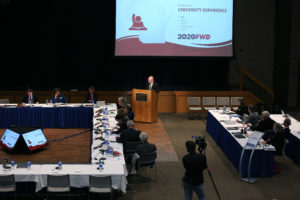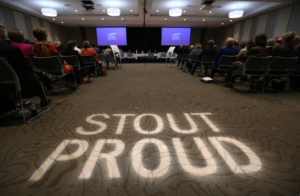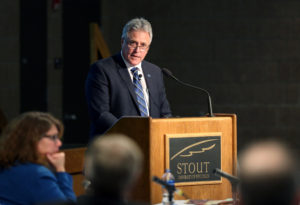MENOMONIE, Wis. – University of Wisconsin System President Ray Cross said that Wisconsin’s demographic trends are among the most significant challenges facing the state and university at this time.
“The convergence of demographics and declining enrollments at a time when we need a more educated populace means we need to be acutely aware and focused on how to best position the University of Wisconsin System for the future of our students and our state,” Cross said, at Thursday’s meeting of the Board of Regents at UW-Stout.
He noted that while Wisconsin’s population overall is growing, its projected workforce numbers are flat.
“We need more of the shrinking number of working age adults to be college-educated. That means we must get more students into and through the education pipeline, if we are to meet future workforce needs,” Cross said.
These competing dynamics are a driving force behind 2020FWD, the UW System’s strategic plan, approved by the Board in August 2016.

UW System President Cross gives a presentation during the full board meeting hosted by UW-Stout. (Photo by Brett T. Roseman, UW-Stout)
As part of the first annual progress report on 2020FWD, Cross provided an overview of six major initiatives the UW System is prioritizing as the plan is operationalized. Those initiatives include strengthening student advising services, making transfers between institutions easier for students, and encouraging undergraduates to participate in more high-impact practices such as internships, research, capstone projects, study abroad, and others.
Other high-priority initiatives include:
- The UW System’s Career Connect website to better connect students with employers,
- Wisconsin Idea Summits, which are designed to bring together people from the business, community, government and the UW to discuss the state’s most pressing challenges and opportunities, and
- The System’s Commitment to Operational Reform and Excellence (CORE), which harnesses the collective power of the System by standardizing, consolidating, streamlining, and modernizing business practices.
“We need to consider now what this university can and should look like in 10-15 years,” Cross said. “We must make some decisions in the very near future to position ourselves wisely to serve those communities that are most directly impacted by demographics and other stressors.”
He pointed out that a system of higher education is a plus at such times, when the economies of scale and shared resources can be leveraged.
“We need to ensure we have a university, infrastructure, and plan that is focused on meeting future needs, not just maintaining the status quo,” Cross said.
Regents approve changes to UW’s administrative hiring policy
The Board approved recommendations to streamline the hiring process for university chancellors and vice chancellors, as well as UW System presidents and vice presidents. The approved recommendations also include broadening the applicant pools so that potential candidates includes leaders from the private sector in addition to academic leaders.
“Recruiting and selecting the leaders of our institutions is one of the most significant responsibilities we have,” said President Cross. “I appreciate the hard work done by the hiring workgroup to help streamline our process and also to help ensure that UW institutions, our students, and Wisconsin taxpayers get the fine leaders they deserve.”
Regent President John Robert Behling had called for the creation of a workgroup last August to address these issues in the context of the 2017-19 biennial state budget, which includes a prohibition against only considering individuals who are faculty members, or who have been granted tenure, or who have terminal degrees, for the positions of UW System president, university chancellor or vice chancellor.
Regent Vice President Drew Petersen, chair of the workgroup, noted that national trends toward the aging of college presidents and a shift in focus of top leadership roles to budget and management also were also drivers of the proposed changes.
“We will need to cast a wider net to attract the best candidates for chancellor, and system president for that matter, in the future,” Petersen said. “As the role of chief executive officers in higher education continues to evolve, this provision will ensure we are able to recruit, attract, and hire candidates with the skills and experience necessary to excel.”
President Cross said he was disappointed that the UW System’s request to veto the chief academic officer position from discussions about considering candidates from non-academic circles was denied. “But I recognize this is now law, and this policy reflects that law,” Cross said.
The work group consulted with higher education colleagues in other states, including the University of California System Chancellor Janet Napolitano, Petersen said. Shared governance and institutional leadership also had input.
Other key provisions of the policy include:
- Making public only the final two or three candidates for a position, rather than all semi-finalists; and
- Reducing the size of the search committee to 10 members, including five Regents, two faculty, one staff representative from the institution, one community and/or alumni member, and one student, all to be appointed by the President.
Responding to questions about reducing the size of the search committee, Behling emphasized that smaller does not mean less input. He said he is committed to ensuring that the voices of the campus community are clearly heard. “These opinions have always been important to a robust search process, and that will continue under this new policy,” Behling said.
UW-Stout celebrates role as Wisconsin’s polytechnic university
Host Chancellor Bob Meyer told Regents that UW-Stout has stayed true to the aim of its founder, James Huff Stout, to emphasize applied learning. “I never tire of employers telling me how they love to hire UW-Stout students because they hit the ground running,” said Meyer, an alumnus and former faculty member at UW-Stout.
As the state’s only designated polytechnic university, UW-Stout is proud to tout its 97.4% employment rate for recent graduates, Meyer said, noting that it affirms how the institution is meeting the needs of the region
The university has significant economic impact in the region, according to Meyer, supporting more than 4,600 jobs and accounting for 2% of the region’s gross domestic product, according to a recent study.
Meyer announced that the institution’s new engineering school – approved previously by the Board of Regents – will be named the Robert F. Cervenka School of Engineering in honor of a $2.5-million donation
The late Cervenka is the founder of Phillips Plastics (now Phillips Medisize). More than 1,000 students are enrolled in engineering or engineering technology programs at UW-Stout, which is part of the Northwest Wisconsin Engineering Consortium with UW-Eau Claire and UW-River Falls.
Education Committee
Jim Henderson, Vice President for Academic and Student Affairs, reported that preliminary enrollment data for the 2017-18 academic year shows a 1.4% decrease systemwide in overall headcount from last year. Transfer enrollments dropped by 3.5%. He also noted that enrollments for both new freshmen and graduate students are up, by 0.5% and 1.3%, respectively.
Henderson told Regents that the UW System has initiated a task force to upgrade the existing policy on academic program review including identifying low-producing degrees and campus actions for programs that may not meet specified productivity levels.
In addition, Henderson reported that the UW System is actively working on developing its outcomes-based funding formula, in accordance with the guidelines provided in the recently-signed state budget. He said the UW System expects to present a formula to the Board for review in December, prior to submitting it to the Joint Finance Committee by the Feb. 15, 2018, deadline.
In other business, the Education Committee:
- Approved a UW-Parkside’s Master of Science degree in Clinical Mental Health Counseling, which will be managed by the Department of Psychology within the College of Natural and Health Sciences. This 60-credit graduate program will equip graduates with the competencies to successfully petition for licensure as Licensed Professional Counselors (LPC) in Wisconsin;
- Approved UW-Stout’s Bachelor of Science in Applied Biochemistry and Molecular Biology. This program will elevate the existing concentration in Biochemistry and Molecular Biology (BMB) within the Applied Science Program, to a major that is better recognized by both prospective students and potential employers; and
- Heard a presentation by UW-Stout Provost Patrick Guilfoile on “UW-Stout – Living the Polytechnic Mission.”
Business and Finance Committee
The Business and Finance Committee received an update on the UW System’s managed travel program which seeks to consolidate campus travel activity with contract vendors in order to provide better service, produce overall cost savings, and ensure a more consistent, standardized approach to handling these activities.
In other business, the Business and Finance Committee:
- Approved the Fiscal Year 2017 UW System Report on Program Revenue Balances and the individual spending plans included in the report. Total UW System unrestricted fund balances continue to decline with total balances dropping from $1.096 billion to $851.6 million (a $244.4 million drop or 22.3%) from FY2013 to FY2017. Over this same period, tuition balances decreased from $551.5 million to $277.2 million (a $274.3 million drop or 49.7%). Current tuition balances represent only 42 days of operating expenses associated with that funding;
- Approved changes to Regent Policy Document (RPD) 25-3 on Use of University Information Technology Resources. The changes more clearly define “information technology resources” and address what would be considered acceptable and unacceptable use of those resources;
- Approved UW System’s three-year agreement with Instructure Inc. for its Canvas Digital Learning Environment platform. The product will replace the Desire2Learn (D2L) Learning Management System that has been in use across the UW System since 2003;
- Approved UW-Milwaukee’s sponsored research agreement with Calcigenix, LLC. This three-year agreement builds on earlier efforts between the institution and Calcigenix. The work for Calcigenix involves evaluation of a particular therapy aimed at curbing age-related cognitive decline;
- Approved UW-Madison’s Master Clinical Study Agreement with QuintilesIMS, Inc. QuintilesIMS is a contract research organization that facilitates the conduct of clinical trials for multiple pharmaceutical companies. Past work performed by UW-Madison for the organization has included trials involving treatments for asthma, diabetes, osteoporosis, and Alzheimer’s disease;
- Approved UW-Madison’s three-year Master Research and Collaboration Agreement with Varian Medical Systems, Inc. Varian is a manufacturer of radiotherapy equipment;
- Approved UW-Madison’s five-year agreement with WP Beverages, doing business as Pepsi-Cola of Madison, for the right to be the exclusive carbonated soft drink and bottled water of UW-Madison Athletics;
- Heard a quarterly summary of gift, grant, and contract awards for the period July 1, 2016 through June 30, 2017. Total awards for the period were approximately $1.439 billion, a decrease of $78.9 million compared to the prior year. Of that decrease, federal awards dropped by $67.8 million while non-federal awards decreased by $11.1 million;
- Heard a high-level summary report comparing budgeted to actual revenues and expenditures through the fourth quarter of the fiscal year. This cash-based management report shows that, as of close of the fiscal year, actual expenditures were approximately 97.1% of the Regent-approved budget, while revenues were at 100.1% of the budgeted level; and
- Heard an update on information security efforts from Vice President for Administration Rob Cramer, and a report on the efforts of the Segregated Fee Working Group from Vice President for Finance Sean Nelson.
Research, Economic Development and Innovation Committee
UW-Stout Chancellor Bob Meyer led an update on economic development and business partnerships across a wide spectrum of high-impact practice areas at UW-Stout.
The Committee heard that UW-Stout’s Discovery Center, which leverages university talent for the benefit of business, industry and the community, accounted for $21.3 million in cost savings/sales for clients, $19.5 million in private investment and 368 jobs created or saved in the last four business quarters, according to Director Randy Hulke. The center’s core principles are enhancing undergraduate research, driving economic development, creating business-industry partnerships and developing fab lab collaborations, Hulke said.
In other business, the REDI Committee:
- Heard a report by Wisconsin Economic Development Council (WEDC) Chief Operating Officer Tricia Braun on current and planned UW-WEDC partnership initiatives. Kathy Heady, WEDC Industry Sector Director, also provided an update on WEDC’s efforts to collaborate with the university and with state businesses to support the innovative expansion of FabLab facilities across Wisconsin; and
- Heard a report by Mark Lange, Executive Director of UW-Extension’s Division for Entrepreneurship and Economic Development, updating Regents on his organization’s initiatives and programs. He also provided information about the “Wisconsin Business Economy” and new economic and business research resources now available to UW System institutions and beyond.
Capital Planning and Budget Committee
The Capital Planning and Budget Committee discussed the context for the 2019-21 capital budget’s strategic goals and also considered potential capital budget scenarios that focus on affordability and accountability.
In other business, the Capital Planning and Budget Committee:
- Approved UW-Madison’s request for amendments to the Declaration of Covenants, Conditions, and Restrictions for University Research Park that establish land and building development guidelines;
- Approved UW-Madison’s request for authority to sell a 1.06-acre parcel of land, located in the Town of Dunn, Wisconsin. The parcel contains an 11,000 square foot building that was used as lodging for visiting scientists to the Kegonsa Research Center until 2014 when the nearby Synchrotron Radiation Center closed. The university has no other use for this facility;
- Approved UW-Stevens Point’s request for authority to execute a temporary land use agreement for construction of an approximately 16,000 square foot open-air amphitheater in the Schmeeckle Reserve and to accept the completed facility as a gift-in-kind. This facility will provide a fully-accessible space for sharing the natural and cultural history of the region and serve as a unique outdoor venue for public programs and artistic performances. Upon its completion, the amphitheater will be gifted to the Board of Regents;
- Approved UW-Whitewater’s request to lease Cambridge Apartments for a five-year term to accommodate the demand for student housing. This facility will provide housing for 285 students and the university will supply the necessary staffing for student services such as resident assistants, security, social programming, and counseling;
- Approved UW System’s request for authority to construct eight maintenance and repair projects at six universities at an estimated total cost of $11.4 million. The projects include facility maintenance and repair at UW-Milwaukee and UW-Whitewater; utility repair and renovation at UW-Stevens Point; programmatic remodeling and renovation at UW-Extension, UW-Madison, and UW-Stevens Point; and energy conservation at UW-Stout;
- Heard a presentation on UW-Stout’s Campus Master Plan; and
- Heard a report from Associate Vice President Alex Roe on recent State Building Commission approvals and 2017-2019 Capital Budget actions.
Audit Committee
Chief Audit Executive Lori Stortz and audit directors provided a high-level overview of recently issued reports related to tuition policy, payroll and P-Card continuous auditing, cash handling, international education and residence life.
In other business, the Audit Committee:
- Heard a report on the 2018 audit plan progress to date;
- Received a high-level overview of the progress management UW System has made toward resolving comments and implements recommendations included in recent audit reports; and
- Heard a summary report of recent hotline activity.
The UW System Board of Regents will resume its meeting at 9 a.m. Friday, Oct. 6, at UW-Stout.


